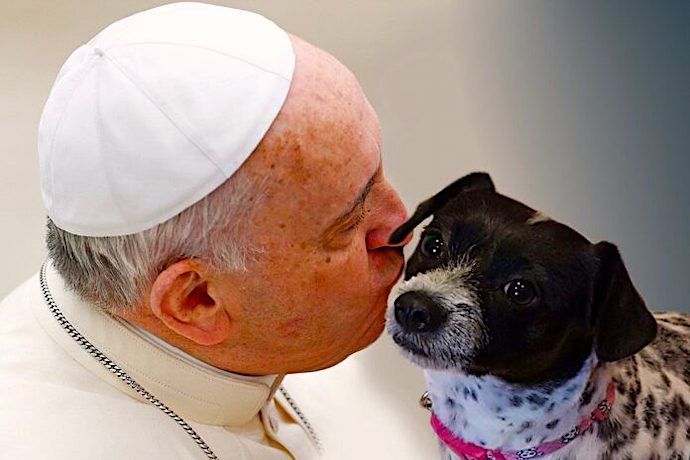Is not having children—and further, living with cats and dogs—selfish? This is precisely what Pope Francis suggested last week when he told a general audience:
“Many couples do not have children because they do not want to, or they have just one – but they have two dogs, two cats… And this denial of fatherhood or motherhood diminishes us, it takes away our humanity… a man or woman who do not develop the sense of fatherhood or motherhood, they are lacking something, something fundamental, something important. Think about this, please.”
He struck a chord, and people did think about it. Many, like The Cut’s Mia Mercado, highlighted the irony of a childless man scolding those without children. My phone went wild with calls from animal lovers, queer friends and childless Catholic couples as well. An estimated 1.1 billion people belong to the Roman Catholic church. But even many of those who aren’t Catholic consider the pope’s words influential or have concerns about how his words can affect cultures, laws, and policies.
I understood why they were dismayed. As an interspecies minister and animal chaplain who identifies as bisexual, doesn’t have children, and lives with her husband and a couple of cats, I was conflicted. Responding to people’s questions wasn’t simple. Indeed, through his remarks, Pope Francis offered us a chance for reflection on the highly complex topic of interspecies living.
I’ve thought about these concerns at length. And with all respect to the pope, in a time of climate crisis, economic pressure, war, poverty, and other anthropogenic violence, some of us lack nothing by choosing not to have children. Instead, we’re gaining something: true respect and reverence for the messiness of living in an interspecies world where the needs of human animals and other-than-human animals are often in conflict and always entangled.
Humans make up just 0.01 percent of life on Earth. The pope’s implication that all couples should reproduce (if they can) would only further overtax the planet for human-only needs. Our demand for ecological resources already annually exceeds what Earth can regenerate.
Nor does Pope Francis consider the cost of raising a child, which may not be realistic for some couples just trying to get by. The average cost of raising a child in the U.S. through age 17 is estimated at over $200,000. This is well out of reach of many couples. So are the resources or funds to go through the complex adoption process. Further, many couples are rejected when trying to adopt.
The Pope’s suggestion that if a couple can’t have a child, they should adopt one ignores policies that prohibit them from doing so within Roman Catholic organizations. While concern for the welfare of orphans is admirable, and I don’t want to diminish the problems facing children around the globe, the Church can’t have it both ways. Pope Francis suggests that humans who cannot have children should adopt one—while Catholic organizations continue to deny same-sex couples the right to adopt.
Moreover, living with animals can be self-care rather than self-ish in many cases. Research tells us that living with cats and dogs can decrease depression, lower stress and anxiety, and improve cardiovascular health. Interspecies homes can also help human children learn empathy or help older adults with dementia curb loneliness. We’ve also learned that cultivating compassion for animals in our homes can increase empathy for wildlife and the Earth.
On the flip side, there is some potential selfishness in living with animals. “Pet keeping” doesn’t always benefit animals, and it is a complicated and controversial topic. Human desires to live with other species downplay their rights to live independent lives. Pets are not always treated well, with many left outside chained to stakes or physically abused.
Hand-in-hand with the pet business comes forced breeding, puppy mills, and “exotic” wildlife trapping (which was the backdrop of Netflix’s popular Tiger King series). Finally, billions of animals will be factory farmed to become cat and dog food. We cannot deny the ecological paw print of companion animals either.
The pope is right about this: pet-keeping, like any widespread practice with an adjacent industry, certainly has the capacity for selfishness. But if he thinks pet-keepers who choose not to have children are selfish because having children is necessary for humanity, the pope is way off the mark.





